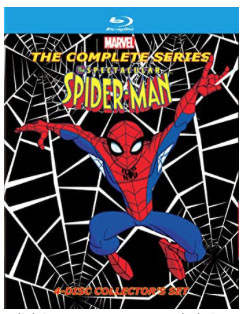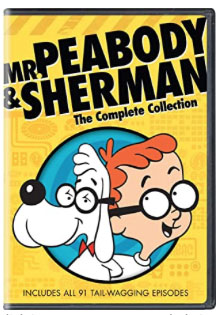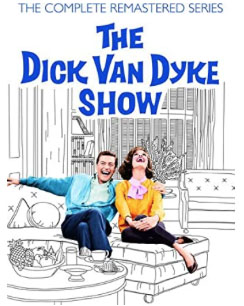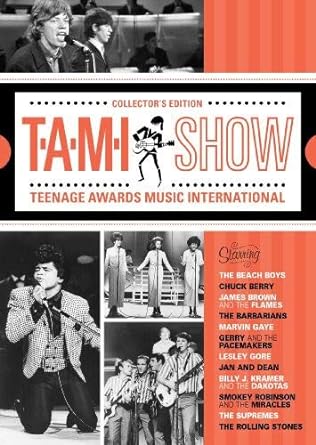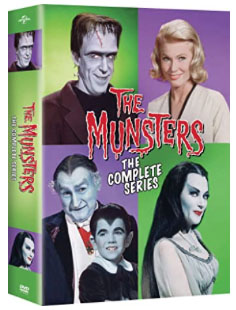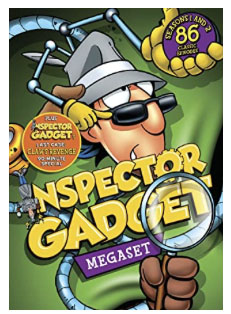|
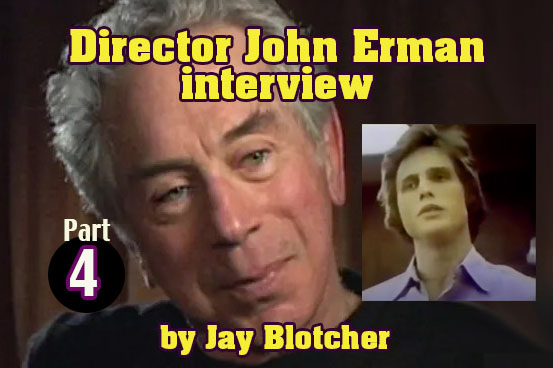
Being Gay in Television in the 1960s & 1970s
PART FOUR: Episodic Television / George Cukor / Claudette Colbert at 83
Homophobic Ray Stark /
A Murderous Abby Mann
PART ONE HERE / PART TWO HERE / PART THREE HERE
Director John Erman
Raw Interview text by Jay Blotcher

Erman: When you get on the Hollywood treadmill, you just kind of go from thing to thing. I was a young man. My Favorite Martian was a show that was done very economically. The reports came back that I had gotten done on schedule, and that everyone liked me, and the shows were good – so then I got other shows.
Blotcher: How long were you with My Favorite Martian?
Erman: A year, then I was with That Girl for a year. And then I did a lot of other crap. [laughs]
Blotcher: So, it was a job for you. But within the constraints of television, did you feel you were beginning to create a [personal] style?
Erman: No. I don’t think I really started to do that until really the end of my episodic career. Right toward the end of it, I began to kind of find my way. But I didn’t really find my way until five years later, when I went through the two features that had not succeeded. [clarification about Making It film] So I gained a lot of character strength. And what George Cukor had said to me was, "If you survive what this situation has presented to you, you will never be frightened of anything again. You will have survived the director’s worst nightmare."
Blotcher: I want to delve more into your relationship with Cukor. Was he a mentor?
 Erman: In a way he was. He was a terrific guy. Unfortunately, I never got to the pool parties. [Scandalous gay gatherings he held frequently.] He was a little old [by then] for the pool parties. But the wonderful thing that happened with George was – in the late ‘70s, I was asked to do a mini-series about Hollywood based on a Garson Kanin book called Moviola. The first of those shows was about the search for [an actress to play] Scarlett O’Hara. And George was a character in it. So, I called him up and said, "Listen, I’m doing this show about Gone with the Wind and I wonder if you would read it for accuracy." And he said, "No, I won’t do that." And I said, "Okay." Erman: In a way he was. He was a terrific guy. Unfortunately, I never got to the pool parties. [Scandalous gay gatherings he held frequently.] He was a little old [by then] for the pool parties. But the wonderful thing that happened with George was – in the late ‘70s, I was asked to do a mini-series about Hollywood based on a Garson Kanin book called Moviola. The first of those shows was about the search for [an actress to play] Scarlett O’Hara. And George was a character in it. So, I called him up and said, "Listen, I’m doing this show about Gone with the Wind and I wonder if you would read it for accuracy." And he said, "No, I won’t do that." And I said, "Okay."
So, we made the show, and George Furth played George Cukor. So, we finished the show, Tony Curtis was the star, and he was wonderful. We finished it and I called George and I said, "Okay, it’s all done. Can I bring it up and show it to you?" And he said, "I don’t think so." I said, "Would you rather see it on your own?" He said, "I don’t think so." So, I let it go.
So, the show goes on the air and George sees it, and he is inflamed. Would not speak to me for like a year. And finally, we ran into each other at a party. By this time, he was pretty old. And he said, "I was angry at you about something, wasn’t I?" And I said, "Yes." And he said, "Well, let’s forget it." I said, "Before we forget it, it was about the search for Scarlett O’Hara and George Furth playing you." He said, "That was it! Why’d you cast somebody so ugly?" Now, George Cukor was the ugliest man I’d ever known. He was plug-ugly. And I kind of went like that [makes expression]. And I said, "Who do you think should have played you?" And he said, "Cary Grant." So that got me over this hump, so to speak, with George Cukor. And he was just wonderful.
Blotcher: I must ask. The legend about why he was thrown off of Gone with the Wind. It had nothing to do with Clark Gable and Billy Haines? [Gable had Cukor fired because Cukor knew that Gable had had sex with the gay Haines when Gable was a struggling young actor.]
Erman: Many people said that. Many people said that. Many people said it was Gable thinking that [Cukor] as just throwing [the picture] to Vivian Leigh. And other people said that the first few weeks’ dailies were boring, and that Selznick was freaked out and didn’t think it was going to be –
Blotcher: So, [Cukor] never addressed it with you?
Erman: No. You couldn’t possibly ask a question like that. He would have just fielded it in some way. But I don’t know; my guess is that it was about Billy Haines. Because those guys, they all put out: Gary Cooper, Clark Gable. Then wanted to forget that.
Blotcher: We were talking about episodic TV –
 Erman: … and then my finding myself. I’d gone through this very bad period. Then I started back into episodes, which was a very bitter pill to swallow, having done a big picture. I was doing a series that didn’t last, but had a lot of quality, called The New Land, which was based on those Jan Troll movies about pioneers. [Starring] Bonnie Bedelia and Donald Moffatt and Kurt Russell. And we were doing a show that somehow had a lot to do with death. And just before we did the show, my father died. My father had been a very restrictive force in my life. He had literally pounded me into the ground. And when he died, I felt liberated. Erman: … and then my finding myself. I’d gone through this very bad period. Then I started back into episodes, which was a very bitter pill to swallow, having done a big picture. I was doing a series that didn’t last, but had a lot of quality, called The New Land, which was based on those Jan Troll movies about pioneers. [Starring] Bonnie Bedelia and Donald Moffatt and Kurt Russell. And we were doing a show that somehow had a lot to do with death. And just before we did the show, my father died. My father had been a very restrictive force in my life. He had literally pounded me into the ground. And when he died, I felt liberated.
And we did this show. And a TV executive from ABC who was also a friend of mine, and who was also gay, called me up and said, "What happened to your work?" Like that. And I thought, Oh fuck! What is the matter here? And I said, "What do you mean?" And he said, "You got so good. And it all had to do with that combination of finding an inner strength and then being liberated." And that was just a couple of years before Roots (II, 1978).
Blotcher: Your mother was still around at the time.
Erman: My mother was still around. My mother was around until I met my partner. At which point, my mother, who was 84, said to me, "I don’t like your friend." And I said, "Really?" She said, "No; I think he’s a fairy." And she said," I think a few of your other friends are fairies. And let me tell you something: when you lie down with dogs, you get up with fleas."
I had made up my mind that I was never going to tell my mother that I was gay. I had a justification for it: She was too old. She wouldn’t be able to handle it. Well, she wasn’t able to handle it. But I did tell her. And I told her that night. I all of the sudden thought, I can’t swallow any more shit. I have pretended for so long. I have been dragging women friends over as my dates. I made up all these lies. My mother couldn’t come to my house unless she called to make sure there was no – It was just an awful life. I wasn’t living with [partner Richard] Blair at that time, but I knew we were on the way to that. For the first time in my life, I found a decent, nice, good human being.
I took her out to a restaurant for dinner and the tables were very, very close together. I don’t know what possessed me to say this, but I said, "Mom, I know how much you love me, and I know you really want me to be happy. And I have to tell you, I am happy for the first time in my life. And it’s because Blair and I are lovers. And we’re going to live together." And she started going nuts at the table and saying things like, "Well, did you ever have sex with a girl?" And I said, "Yeah." And she said, "Didn’t you like it? Your father and I loved it!" I said, "Well, it was okay." She just kept at me. Finally, I said, "Don’t make me make a choice. Because if you do, you’re not going to like the choice I make." She stopped speaking to me for quite a while. And then, [Richard] Blair and I had already moved in together and she had to accept it – or lose me. And she ended up loving him. Loving him. He was wonderful with her. Toward the end of her life, he was much better with her than I was – because he didn’t have any baggage with her.
Blotcher: You’ve had quite an amazing life.
Erman: I have had a wonderful –
Blotcher: And you have amazing recall, as well, which is so –
Erman: Very nice. You know, I worked with Claudette Colbert when she was 83, and she had the most amazing mind. You could ask her about the 30s and she could remember everything.
Blotcher: This was in theater?
 Erman: No, this was a miniseries called The Two Mrs. Grenvilles. Erman: No, this was a miniseries called The Two Mrs. Grenvilles.
God, you’ve done everything – I was fascinated to hear that that [miniseries] had its roots with the tobacco scion – no, Libby Homan?
[laugh] Oh, that’s another good story! The Two Mrs. Grenvilles was based on a case here in New York with a family named Woodward. Billy Woodward married a showgirl. Her name was Ann something-or-other and she ended up shooting him. And [his] mother defended her because she didn’t want scandal in her family.
So, I make The Two Mrs. Grenvilles, and I’m off doing another job. In those days, they used to still have telegrams. This telegram gets put under my door. And I open it up and it says: "I just saw The Two Mrs. Grenvilles. You are an absolutely brilliant director and I have a project I want to do with you. Signed, Ray Stark." So, I picked up my phone and I called my agent and I said, "Ray Stark--." And he said, "I know all about it." He said, "He’s going to send you some material and see if you like it."
And what he sent me was The Libby Holman Story – which was the same story! But I couldn’t just say, [loud voice] "Nooo, Ray, I just did this." So, I’m being very polite, and he said, "I have several scripts on this book." He said, "They’re all terrible because they were all written by faggots." And I said, "I don’t think I’m the person you’re looking for." And he said, "Why not?" And I said, "Because I’d be your fifth faggot." And he went, "Oh, oh." And he put down the phone and called my agent and he said [Erman yells], "Why didn’t you tell me?" And my agent said, "Because it’s none of your business. Why would I tell you about his sexual orientation?" [Stark replied] "Well, I’ve just made this terrible mistake."
So, we danced around with The Libby Holman Story for a while. He wanted – and he wanted desperately – Debra Winger, because she had just done Terms of Endearment. But we never got to a piece of literature that he liked. I think we talked about getting different writers to do the fifth script and it just fizzled out. He was the kind of guy who had his fingers in a million different pies. And I wasn’t keen – I didn’t like working with him, because he made me very nervous. He was so hyper. And I really didn’t want to do the same story again.
Blotcher: I remember you saying [in our previous interview] of the two projects in your career that you are most proud of are Roots and An Early Frost. What about on the flip side? Were there some that were just excruciating from beginning to end and you’d just as soon forget about them?
Erman: Yessss….
Blotcher: … except I’m bringing it up?
 Erman: There were. What was the worst experience? By far the worst experience was The Atlanta Child Murders because it was written and produced by a man named Abby Mann -- Erman: There were. What was the worst experience? By far the worst experience was The Atlanta Child Murders because it was written and produced by a man named Abby Mann --
Blotcher: Judgment at Nuremberg – yeah.
Erman: Abby Mann was one of the world’s most terrible people. Paul Winfield was one of my great friends, and he had just done King for Abby Mann. And I called him up and I said, "Paul, Abby Mann –" And he said, "Yes –" And I said, "How do you feel about him?" And he said, "Let me put it this way; if I were dying and in the gutter, I would never work for him again." At which point I took the job because it was such an interesting piece of material. But what I didn’t know is that Abby Mann wanted to direct it himself. So, he was hovering over me at every minute. And it was a huge all-star cast, with Jason Robards and Rip Torn – all these wonderful people. And [Mann] would be on top of me like a tarantula. He was this horrible-looking creature.
One day, he called up the line producer early in the morning and he said, "What would happen if John met with a serious automobile accident?" And the line producer said, "You wouldn’t be the director because the Directors Guild refuses to let anybody who’s on the producing team take over the directing." That’s the only reason I’m alive. He would have had me killed. He was that bad a man. That was far and away the worst [inaudible].
Blotcher: What about your gay friends in the industry? Was there a sense of camaraderie, a sense of unity? Did you help each other, did you cover for one another?
Erman: I don’t know whether I’d say that. What I would really say is we huddled.
Blotcher: Hollywood is perceived to be much more liberal than the world at large but still, if you were gay [in Hollywood], you will start part of a subset, a microcosm. There wasn’t much intermingling –
Erman: Socially, most of my friends were gay in those days. Now, [laugh] most of my friends are straight. Go figure. But I was a sort of an unwilling part of the first political gay movement. But I never took it seriously because I never felt it would happen. I thought it was unrealistic. So, I would go to some of the meetings where people were really trying to organize, and I would kind of [lowers voice] whisper and joke. Because I just thought, well, this could never happen. We could never be “as good as.”
Blotcher: Who was spearheading these meetings?
Erman: David Mixner. And some of those guys whose names were in that show that was just done down here. [The play The Temperamentals about the origins of the Mattachine Society.] There was a guy named Shelley Andelson.
Blotcher: New York-based?
Erman: No, California-based, most of them – the ones I came in contact with. There were a lot of young lawyers in the groups, and they’re the ones who took it seriously. But there were this sort of Gay Mafia.
Blotcher: Who was the most prominent at that time?
Erman: Well, you can’t really say that because the Mafia – there were different branches. We would all have our own little covens. [laugh] I hung out with a group of people, most of whom are dead from the AIDS virus. But there were different groups and different levels.
Blotcher: Were your friends in the business?
Erman: Oh, yeah. When you live in Los Angeles, all you think about is the business. There is no other world. All of my friends were in the business. And the best thing that ever happened to me is that I moved to London and I all of the sudden realized there was more to the world than Los Angeles. And it changed my life.
Blotcher: What motivated that move?
Erman: I was working over there a lot. And my mother had finally died, and I realized I didn’t have to stay in LA. And my partner was a make-up artist, and he didn’t have to stay in LA. I was over there working and the last big earthquake happened [Northridge in 1994]– and we had lived through so many earthquakes. I came home from work and I said to him, "Let’s not go back." He’s an angel. He said, "Okay but why?" I said, "We don’t need any more earthquakes in our lives." So, we sold our house.
Blotcher: Where had you been living?
Erman: I lived on the West Side of Los Angeles most of my adult life, between Beverly Glen, which is sort of at the beginning of Westwood, and the far reaches of Brentwood, for about 35 years. For some reason, that’s where I gravitated to. And I went out there at a time when nobody lived on the West Side, and all of my gay friends said, "Are you crazy?" [I said] "You guys stay in West Hollywood." Well, I didn’t like West Hollywood. I had taken two places to live in West Hollywood and I was really uncomfortable; I just didn’t want to be in that scene. So, I moved to Brentwood, where I [inaudible].
Blotcher: When you moved to London, where did you live?
Erman: The first apartment we had was in Knightsbridge and the second apartment we had was in Chelsea.
Blotcher: Did you direct while you were there?
Erman: I did a lot of co-productions. Mini-series.
Blotcher: So, you were sticking with television by then?
 Erman: Oh God, yes. The last feature I did was a feature at Disney with Bette Midler called Stella [1990]. Erman: Oh God, yes. The last feature I did was a feature at Disney with Bette Midler called Stella [1990].
Blotcher: Was that [with] Trini Alvarado?
Erman: Yes. Who was cast for the most insane reason; She looks about as much like Bette Midler as I look like Mother Teresa. But when we started to do the screen test, Bette started to sing and Trini started to sing with her, and the executives at Disney said, "Aren’t they adorable together?" That was not a show I directed; that was just a show I [staged] because Disney did everything. After that, I didn’t want to do any movies – [raises voice] nor did anyone want me. [laugh]
Blotcher: But TV was growing at that point. There was a measure of respectability in the 70s. TV was maturing – a little behind – but in the way that film was. Taking on grittier topics. Did you gravitate towards grittier topics?
Erman: Yes. I did. To be fair, I really got the pick of the litter of TV projects for a while. They have lists and I was kind of at the top of the list. I did a lot of things that I liked. I did a few things that I didn’t like. I was very lucky that I did some distinguished things.
Blotcher: Projects come and go and people come and go. Were there actors whom you had the opportunity to work with a few times?
Erman: Yeah, Ann-Margret. I had met Ann-Margret at a party, and I was so impressed with how different she was than what she presents. I was asked to do a film about a farm woman who finds out she has cancer, and she has ten children and has to find homes for all of them. [Who Will Love My Children] We went through the usual suspects. I forget who was at the top of the list in those days. But we offered it to several people. Some of them said, I don’t want to do a cancer story. Sime of them said, I don’t want to do a television movie. Some of them said, I don’t like it. Finally, I went to [the producers] and said, I think we should offer this to Ann-Margret. And the network executives said, That is the stupidest idea I have ever heard. Just keep looking! We offered it to Vanessa Redgrave. It took weeks and weeks and weeks.
Blotcher: What year was Who Will Love My Children?
Erman:’83. So, finally I had the nerve to say to [inaudible], "Are you sure you’re not interested in Ann-Margret?" And the executives said, "If you mention her name one more time, you will be fired." [lowers voice to whisper] "All right, okay." He said, "You go out and you find an unknown. And we’re gonna make this movie with an unknown." Such good material, we’re going to make this movie with an unknown.
So, I go back to my roots, which was those little theaters in West Hollywood, and I see a play and Judith Ivey is in it. I ask her to come in and she reads for me, and she’s great. She looks exactly right. I call the network and I say, "I found this girl. She’s never done television. She’s just wonderful and I think she’d be fine." [They say] "Okay, okay. Bring her in."
So, you go into those network casting meetings. There must have been twenty people in the room, sitting there in their suits. And Judy grabs my hand and I say [whispers] "It’s fine; just relax. Don’t look at them, look at me. I’m going to read with you. Just look at me."
So, she reads. There’s a beautiful scene in it where she tells her children that she’s dying, and she has to leave them. It was really well received, and she does it flawlessly. She finishes and nobody wants to say anything because they want to hear what the big executive has to say. And he’s not saying anything in front of the talent. So, I said, "Judy, that was really wonderful." I walked her out and I said, "I don’t know what’s gonna happen. You couldn’t have been any better. I’ll call ya."
So, I go back into the room and we’re sitting there, and this guy says to me, "You really believe in this woman?" I said, "Yes." "You really believe she can carry the show?" I said, "Yes." He said, "You realize if she doesn’t, if it doesn’t work, you’re gonna be blamed?" Well, I had gone through the worst thing that could have happened to me. I said, "Yeah, I realize that."
Long, long, long, long pause. [Then he said] "What about Ann-Margret?"
 So that was the beginning of a run I had with her that was really nice. We did A Streetcar Named Desire, we did The Two Mrs. Grenvilles. She did several mini-series for me. And we did that movie that didn’t work, about AIDS. [Our Sons, 1991] And I really think the reason it didn’t work is because she and Julie Andrews just didn’t hit it off. And chemistry is a big part of it. But it formed a friendship that is so strong to this day. She’s like my family. So that was the beginning of a run I had with her that was really nice. We did A Streetcar Named Desire, we did The Two Mrs. Grenvilles. She did several mini-series for me. And we did that movie that didn’t work, about AIDS. [Our Sons, 1991] And I really think the reason it didn’t work is because she and Julie Andrews just didn’t hit it off. And chemistry is a big part of it. But it formed a friendship that is so strong to this day. She’s like my family.
[Discussion of Ann-Margret and her fearless performance in the film Tommy]
She is wonderful. If she gets a part – if she grasps it – you can’t stop her. She did something really interesting when we did Streetcar. Coz she’s the last person in the world you would think of for that part. They offered it to her, and she said, "The only way I’ll do it is if John will direct it." I thought, I don’t know if this is a good idea. Her husband [Roger Smith, also her manager] called and told me this and I said, "I’ll call you back," and I hung the phone up and I went into our living room and I sat in the dark and I thought, I’ve never been offered material this good. But people do Hamlet all the time, people do Death of a Salesman all the time. People do Streetcar –
[I said to myself] I believe in her. I’m not sure I believe that this is ideal casting, but I believe in her, so let’s try it. [Ann-Margret] said to me, "I want to go to the South and I want to meet some people who may help me find this character." My closest friend was from Birmingham, Alabama. He had moved back to Birmingham. I called him up and I told him what was going on, and he said, [assumes drawl] "You send her down here and I’ll have my cousin Lee give a tea for her." Well, she went down there, she met those women, she spent some time with them, she came back, she said, "Okay, I think I know what to do." She’s a remarkable woman.
Blotcher: Does she have any desire to work again?
Erman: Yeah, she just did CSI. She got an Emmy a couple of weeks ago for Law and Order. As a matter of fact, it’s really odd, because when I watched our show [Alexander: The Other Side of Dawn] and saw Jean Hagen, that was exactly what they did with Ann-Margret in this Law and Order; they had her sitting in front of – she was playing a deranged kind of barfly. They had her sitting in front of one of the most glamorous pictures ever taken of her.
 Blotcher: That’s what I wanted to talk to you about. About Jean Hagen [landlady in Alexander: The Other Side of Dawn]. Blotcher: That’s what I wanted to talk to you about. About Jean Hagen [landlady in Alexander: The Other Side of Dawn].
Erman: …I wish I could find that picture; it’s such a great picture.
Blotcher: How was she cast?
Erman: I think what happened, you know, the word gets out that you’re doing a show and people talk and I think her agent said, "Would you be interested in Jean Hagen?" I immediately said, "Yeah." It turned out she had cancer; she lived a very short time after [inaudible]. What you heard [he speaks hoarsely] in her voice, that was the cancer.
Blotcher: So, she was having treatment at this time? Because her face is somewhat immobile.
Erman: Yeah, she was having a lot of treatment.
[Discussion about the powerful Hagen performance in Alexander, informed by her personal history.]
Erman: She was great. It was a one-day job and she was great. The other one that I loved in [Alexander] was Juliet Mills. She was just a friend and I said, "We gotta get somebody classy to play [inaudible]." I loved that scene [where Mills plays a wealthy married woman who buys Alexander for the evening].
Blotcher: This is light years after Nanny and the Professor, which was 1969 or ‘70. I was trying to think, what else was she doing at the time that she would take a role like this, which I guess could be considered controversial.
Erman: Juliet is a wild woman and I think it just tickled her.
Blotcher: I’m wondering if this film [about older women and younger men] inspired her to go and get Maxwell Caulfield.
Erman: She had three of them by that time; she had one young man after the next.
Blotcher: That line she utters the morning after [to Alexander], "I like your act. Innocent. I can almost believe it." A friend of mine still uses that line to this day. [Erman laughs] And he shares with me the obsession for Alexander.
[Discussion about my growing up gay in suburban Boston in the 1970s before interview tape suddenly ends]
Erman: Did you have this kind of background as a young man? Did you come from a small town and get kicked out?
Blotcher: I came from a small town outside of Boston, south of Boston, on the way to Cape Cod. And the saving grace for me in tis half-Jewish, mostly-Irish Catholic town was that the country club on the edge of town, that had been a Jewish country club, changed hands and became a gay country club. And they kept the Polynesian Tiki Bar and they kept the pool and they kept the cabañas, and they kept the shuffleboard – but it was membership gay-only. I had the chutzpah to start going there my senior year of high school. I couldn’t tell you how I managed to do that, because certainly I wasn’t raised to be brave. You’re raised to follow the status quo, no matter how suffocating it is. Anyhow, that’s how it began with me. The arts – I always gravitated towards the arts. I had a kind of whit of talent so I resigned myself to the fact that I would just be an omnivore when it came to the arts. I remember watching Alexander and being fascinated by it, and it was a touchstone for me. It wasn’t like it was a cautionary tale – don’t let this happen to you. [Erman laughs] It was a representation of homosexuality on TV and that was few and far between. The only thing that was on at the time was The Nancy Walker Show and she had a gay secretary – a male secretary.
Erman: Was that Bill Daniels?
Blotcher: I don’t think so. It was a guy with glasses and a balding head and I just remember ---
[sudden end to interview]
PART ONE HERE / PART TWO HERE / PART THREE HERE
Hit
Shows of the Seventies: Hitchhiker's
Guide to the Galaxy / Gene
Roddenberry in the 1970s / 1977-1978 Superhero & Science Fiction TV Shows / Funniest SNL Skit Ever! / Remembering Suzanne Somers / Prisoner: Cell Block H / Why John Amos Left Good Times / Reviving Match Game / How Betty White's 'Happy Homemaker' Came About / Remembering Cindy Williams / Creating The Rockford Files / TV Dads Talk Sex & Fatherhood / TV Shows We Watched 50 Years Ago / How Maude Came About / History of the Miniseries / The Hagers Rediscovered! / Rare Audio of Bette Davis' Broadway Bound Flop 'Miss Moffat' / Interview With Director John Erman / Orson Welles' Last Interview / Remembering Ed Asner / When PBS Got Naked: Steambath / Bruce Vilanch on Writing for Donny & Marie / Writing For Fernwood 2 Night / 3 Girls 3 / Kris Kristofferson vs Barbra Streisand on A Star Is Born? Kinda... / Remembering Gavin MacLeod / When Sammy Davis Jr Kissed Archie Bunker / 20 Funniest SNL Skits of All Time / Cher Reviews Her Iconic Outfits Since 1965 / Best Columbo Episodes / Star Maidens Sci-Fi Series / Sonny Bono's Last Show 1974 / Mary Richard's Apartment Keeps Moving Around Town / Interview with Cindy Williams (Lavern & Shirley) / One of the Most Controversial Episodes of All In The Family / Outside Chance / Remembering Carol Wayne / The Night Johnny Carson Broke Down / Real People / That's Incredible! / Gavin MacLeod on His MTM Castmates / Norman Mailer & Muhammad Ali / Charles Nelson Reilly Flops on Broadway / Chuck Norris vs Eva Gabor / Dear Detective / Dirty Sally / Peggy Lee & Anthony Newley's Weird Pre-Show Rituals / The Protectors / Chevy Chase Talks Hollywood Cocaine Parties / 1977 Season Show Openings / Love Boat's Oscar Winning Guest Stars / Henry Fonda's 4 Favorite Films / Tom Snyder Interviews Star Trek Cast & Harlan Ellison / The Corner Bar / Tim Conway's 'The Dentist' Sketch / Roy Radin Revue: Drunken Ronnie Spector / Henry Winkler on His Happy Days Audition / Patrick Duffy of Dallas Interview / Time Express / Wonder Woman Leaves Paradise Island / 1972-73 TV Season / George Burns on the Carson Tonight Show in 1989 / Best Season of Dallas Ever? / Cloris Leachman Remembered / Ken Berry Interview / Why Barney Miller Ended / Vivian Vance Almost Joined the Cast of Rhoda / Marilu Henner Talks About Andy Kaufman / Cher on Mike Douglas 1979 / TV Show Book Tie-Ins / 1972 Jackie Robinson Interview / Dr. Strange 1978 TV Movie / Kathy Garver Interview / Space: 1999 / Paint Along with Nancy Kominsky / Mary Kay Place Albums of the 1970s / The Supremes - Mary Wilson vs Diana Ross / When Bruce Dern Killed John Wayne / 1974 Tom Snyder Our Gang Special / Remembering Ken Berry / Bruce / Caitllyn Jenner? / Billy Crash Craddock Interview / Melissa McCarthy Almost Quit Acting Days Before Landing Gilmore Girls / Bar Rescue's Wildest Customers! / TV HITS - By the Numbers / Alex Baldwin On His TV and Film Roles / Ray Charles' BIG Problem With TV / Top Ten Sitcoms of the 1970s / James Cameron Made No Money for Titanic / Growing Up In The Playboy Mansion / Ed McMahon Drunk on the Air! / Lucy Interviewed by Barbara Walters / Valerie Harper Cancer / Jeff Bridges Breaks Down His Iconic Roles / Dallas vs Eight is Enough / 1974 MAD Magazine TV Special - Never Aired! / Iconic M*A*S*H Restaurant Coming To Kroger? / When Lucy Got Fired / Partridge Family and Brady Bunch at Kings Island theme park 1972-73 / Awkward Talk Show Moments / Allan Blye Interview / Jack Benny's Last Tonight Show 1974 / Patricia Heaton's Audition for Everybody Loves Raymond / Ed Asner Interview / Norm Macdonald vs OJ Simpson / Tony Kornheiser Interview / Freddy's Nightmares TV Series / Emmy Award Multiple Winners / Nathaniel Taylor aka Rollo Lawson / Mary Kay Place Albums of the 1970s / That Girl & TV's Single Working Women / Can You Identify These Stars? / Betty White vs Joan Rivers / Paul Lynde's Greatest Hollywood Squares Zingers / Sonny Comedy Revue / Star
Trek Animated / Dark Shadows / Hal Linden Interview / Dark Shadows Movies / Dark Shadows Novels / The Night Stalker / One of the Funniest Carol Burnett Show Skits Ever / Fred 'The Hammer' Williamson / Johnny Carson interviews Lucille Ball / Dawn Wells / Betty White : An Appreciation / Bette Davis' 2 Best Interviews 1971 / Barbara Eden Interview / Gavin McLeod / Spider-Man 77 / The Next Step Beyond / The Music Dark Shadows / 1970 TV Shows / Mike Connors Remembered / Mike Wallace, Virginia Graham & Jim Longworth / Dick Clark / Woody Allen Hosts Tonight Show 1971 / Carson Tonight Show / Alan Alda Interview / Jackie Gleason Show / 1973 TV Shows / Thriller / Post Modern Sitcoms / Elvis in Greensboro / Remembering Dick Van Patten / TV Dating Shows / The Jacksons TV Show / Fall
Previews of the 70s / Lance
Link, Secret Chimp / Star
Wars Holiday Special / Alias
Smith and Jones / 1977
Year in Review / Top
Ten 1970-76 / The
Rockford Files / All
in the Family / Sam Hall (Dark Shadows) Interview / Actor Ed Nelson / Death of Archie / Battlestar
Galactica / Wonder
Woman / Network
Jingles / Class
of '74 / Happy
Days / Good
Times / Mr.
Bill / Dinah! / Maude / Doris
Day Show / Pamelyn
Ferdin Interview / The
Bicentennial Minute / Jingles & Catch Phrases of the 1970s / Early
Cable TV 1970s / TV
commercials for Women / TV Moms / Red Skelton / George Lindsay / Country Music TV Shows of the 1960s & 1970s / Betty White Show / Shirley Jones Interview / Tom Bosley / Rodney Dangerfield / How Sanford & Son Ended / Sanford & Son Spin-Off Grady / Great Memoirs / Virginia Graham Show / The "N" Word on TV / 10 Classic Comedy Routines You Have To Laugh At Before You Die / Hollywood Squares / 1970's Teen Idols & The Hudson Brothers / TV Stars with 3 Hit Shows / The Rookies / Unsold Pilots / Jackie Cooper / The Good Guys / Match Game / Make Room For Granddaddy / Mannix & Gail Fisher / Bette
Midler in the 1970s / Bonus 1970's Stuff: Silent Star Marion Mack / Biff Burger / 1970s Fast Food Chains / Latin Casino / Beverly Hills Supper Club Fire / 1970's Daytime Talk Shows / The Fess Parker Show / Brady Bunch Sex Dungeon? / Love, Loss & What I Watched |

It is what it is!
Director John Erman
Interviewed About
Alexander: The Other Side of Dawn
TV
on DVD/
/Holiday
Specials on DVD
TV
Commercials on DVD
|








